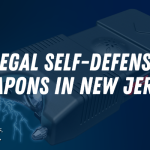There are specific laws and regulations when it comes to transferring gun ownership between family members in New Jersey. It is not as easy as simply handing over your gun to another relative. New Jersey has some of the strictest gun laws in the United States, which are designed to ensure the safety and security of the residents of the Garden State.
On This Page:
- Overview
- Steps to Transfer Gun Ownership
- Special Considerations
- Can I Gift a Firearm?
- Penalties for Non-Compliance
- How to Transfer
- NJ Handgun Transfer
Whether you are transferring a firearm as a gift, inheritance, or any other reason, you need to understand the official legal process involved so that you can avoid potential legal issues.
Overview of New Jersey’s Gun Laws
New Jersey has a number of gun laws that are designed to regulate the sale, purchase, and transfer of firearms. These laws are meant to prevent the unauthorized possession and misuse of firearms in the state. These laws apply to all transfers, including those between family members. Some key requirements include:
- Firearm Purchaser Identification Card (FPIC)– Anyone who purchases or receives a firearm from someone else in the state of New Jersey must possess a valid FPIC. This applies to all types of guns including rifles, shotguns, and handguns.
- Permit to Purchase a Handgun– If the firearm being transferred is a handgun, the recipient must obtain a Permit to Purchase a Handgun, even if they are being gifted the gun.
- Background Checks– To legally transfer a gun to a family member, the family member receiving the gun must have a background check must be conducted before the transfer happens.
- Age Requirements– The family member receiving the gun must be at least 18 years old for long guns and 21 years old for handguns.
Steps to Transfer Gun Ownership Between Family Members
- Verify Eligibility: Ensure that both the current owner and the recipient meet all eligibility criteria for owning a firearm in New Jersey, including age requirements, background checks, and possession of the necessary permits and identification cards.
- Obtain The Necessary Permits: Depending on the type of gun being transferred, the recipient must obtain a Firearm Purchaser Identification Card (FPIC) and, for handguns, a Permit to Purchase a Handgun from their local police department.
- Complete a Background Check: Conduct a background check through a licensed firearms dealer to ensure the recipient is legally allowed to possess a firearm in New Jersey. The dealer will verify the recipient’s permits and identification.
- Complete a Certificate of Eligibility: Both parties must complete a Certificate of Eligibility form to attest that the recipient is eligible to own a firearm under New Jersey law.
- Document the Transfer: Keep a record of the transfer, including the firearm’s make, model, serial number, and the names and addresses of both parties, as well as the date of the transfer. This documentation is important for legal and insurance purposes.
- Hand Over the Firearm: After completing all steps, the original owner can hand over the firearm to the recipient. Ensure compliance with New Jersey firearm transportation laws, such as keeping the firearm unloaded.
Special Considerations for Inherited Firearms
When a gun is being transferred as part of an inheritance, there are some special guidelines to be aware of. If the will ends up in probate, the executor of the estate must follow the probate process. The firearm can only be transferred to a legally eligible recipient. During the probate process, immediate family gun transfer NJ rules allow family members who meet the legal requirements to possess the firearm. It is important to note that the firearm must be transferred to a legally eligible recipient within 90 days of the family member’s death unless an extension is granted by the court.
Can I Gift a Firearm to a Family Member in Another State?
One common question is, can I gift a firearm to a family member in another state? In New Jersey, transferring a gun to someone who resides in another state is more complicated. Federal law requires that the transfer must go through a licensed firearms dealer in the recipient’s state of residence. The recipient must comply with the gun laws of their state, including undergoing background checks and obtaining any necessary permits. Therefore, NJ firearm transfer to family outside New Jersey involves additional steps and considerations that must be carefully followed to stay within legal boundaries.
Penalties for Non-Compliance with Gun Transfer Requirements
Failure to comply with New Jersey’s gun transfer laws can result in severe penalties, including fines, imprisonment, and the loss of the right to own firearms. It is crucial to adhere to all legal requirements to avoid these consequences.
How to Transfer Gun Ownership to Family
Transferring gun ownership to family members in New Jersey involves a detailed process to ensure compliance with the state’s strict gun laws. By following the outlined steps and understanding the legal requirements, you can safely and legally transfer firearms within your family. If you have any doubts or questions, consider consulting with a legal expert specializing in New Jersey firearms law to guide you through the process and ensure all regulations are met.
NJ Handgun Transfer Between Family Members
If you are transferring a NJ handgun transfer between family members, the process is very similar to transferring other firearms, but there are specific additional requirements for handguns. The recipient of a handgun must not only have a Firearm Purchaser Identification Card (FPIC) but must also secure a Permit to Purchase a Handgun from their local police department before the transfer can occur. As with all gun transfers in New Jersey, following all legal steps carefully is essential to avoid legal complications.




